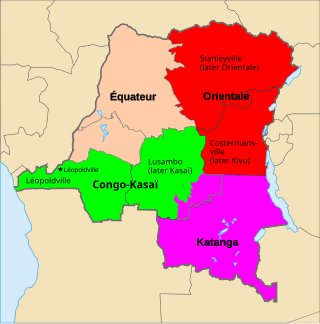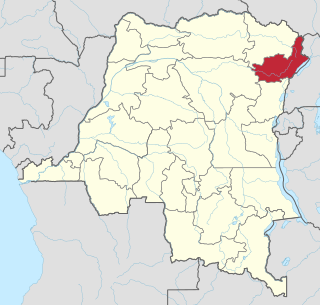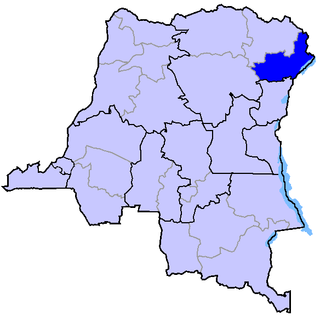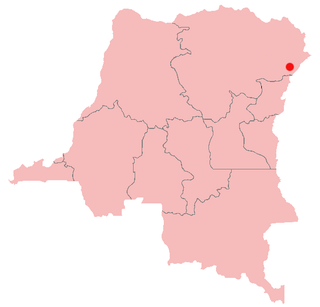
Orientale Province is one of the former provinces of the Democratic Republic of the Congo and its predecessors the Congo Free State and the Belgian Congo. It went through a series of boundary changes between 1898 and 2015, when it was divided into smaller units.

The Ituri Rainforest is a rainforest located in the Ituri Province of northeastern Democratic Republic of the Congo. The forest's name derives from the nearby Ituri River which flows through the rainforest, connecting firstly to the Aruwimi River and finally into the Congo.

Ituri Province is one of the 21 provinces of the Democratic Republic of the Congo created in the 2015 repartitioning. Ituri, Bas-Uele, Haut-Uele, and Tshopo provinces are the result of the subdividing of the former Orientale province. Ituri was formed from the Ituri district whose town of Bunia was elevated to capital city of the new province.

The Ituri conflict is an ongoing low intensity asymmetrical conflict between the agriculturalist Lendu and pastoralist Hema ethnic groups in the Ituri region of the north-eastern Democratic Republic of the Congo (DRC). While the two groups had fought since as early as 1972, the name "Ituri conflict" refers to the period of intense violence between 1999 and 2003. Armed conflict continues to the present day.

Bunia is the capital city of Ituri Province in the Democratic Republic of the Congo (DRC). It was part of the Orientale Province until that province's dissolution.

Operation Artemis, formally European Union Force Democratic Republic of the Congo (EUFOR), was a short-term European Union-led UN-authorised military mission to the Democratic Republic of the Congo in 2003, during the Ituri conflict. ARTEMIS is considered the first military operation led by the EU, the first autonomous EU operation, the first rapid response mission of the EU, first operation outside Europe, first operation applying the principle of the framework nation and first example of "relay operation", conducted in cooperation between the EU and the United Nations. The deployment of EUFOR troops quickly decreased the conflict's intensity. It marked the first autonomous EU military mission outside Europe and an important milestone in development of the European Security and Defence Policy.

The Front for Patriotic Resistance in Ituri is a Bunia-based armed militia and political party primarily active in the south of the Ituri Province of northeastern Democratic Republic of the Congo.

Petronille Vaweka is a humanitarian NGO activist and was the interim chairperson of the Ituri Interim Assembly of Ituri Interim Administration, while in transition from the status of a district of Orientale Province to a province of the Democratic Republic of the Congo. She worked with the Ituri Pacification Commission in 2003, which helped establish the assembly. In addition, she was elected as Ituri's representative to the National Assembly.
The Ituri Interim Assembly is a 32-member legislative body that serves as the legislature of Ituri region of the Democratic Republic of Congo. It was created in April 2003 by the Ituri Pacification Commission, a UN-sponsored commission that assessed the current state of conflict in the Ituri region. Petronille Vaweka is the chairperson of the Assembly and represents the province in the National Assembly in Kinshasa.
Emmanuel Leku Apuobo was the Administrator of the Ituri Interim Administration in the Democratic Republic of the Congo from April 2003 to 2016. The Administration governed Ituri District of Orientale Province until 2015, when it became Ituri Province.

The Ituri Interim Administration is an interim body that administers the Ituri region of the Democratic Republic of Congo (DRC). It was established in 2003 by the Ituri Pacification Commission and supported by the UN mission in the DRC.

United Nations Security Council Resolution 1484, adopted unanimously on 30 May 2003, after recalling previous resolutions on the situation in the Democratic Republic of the Congo, the Council authorised Operation Artemis in Bunia, the capital of Ituri Province, amid the deteriorating security situation in the area.
The Ndaka people are a Bantu ethnic group of the northeastern Democratic Republic of the Congo, many of whom live in the Mambasa Territory of the Ituri Province.
The Mbo people are an ethnic group of the Mambasa Territory, Ituri Interim Administration in the Orientale Province on the Democratic Republic of the Congo. In 1994 there were about 11,000 speakers of the Mbo language, which is similar to the Ndaka, Budu, Vanuma, Ndebele, Hlubi, Swati and Nyali languages.

Ituri District, later Kibali-Ituri District, was a district of the Belgian Congo and the Democratic Republic of the Congo. It roughly corresponded in area to the present Ituri Province.

Haut-Uele District was a district of the Belgian Congo and the Democratic Republic of the Congo. It was formed from part of Uele District in 1912. It roughly corresponded in area to the present Haut-Uélé province.

Bas-Uele District was a district of the Belgian Congo and the Democratic Republic of the Congo. It was formed from part of Uele District in 1912 and was later merged into Uele District, then split out again. There were various boundary changes. It roughly corresponded in area to the present Bas-Uélé province.
The following events took place in 2001 in the Democratic Republic of the Congo.

Stanleyville District was a district of the Belgian Congo and Democratic Republic of the Congo. It went through various changes in extent. Between 1933 and 1963 it had roughly the same extent as the current Tshopo province.

Nord-Kivu District was a district of the Belgian Congo and the Democratic Republic of the Congo. It roughly corresponded in area to the present North Kivu province.














